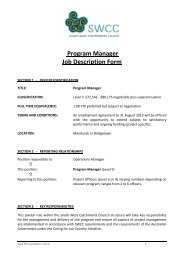Tender for the Programme - South West Catchments Council
Tender for the Programme - South West Catchments Council
Tender for the Programme - South West Catchments Council
You also want an ePaper? Increase the reach of your titles
YUMPU automatically turns print PDFs into web optimized ePapers that Google loves.
DRAFT<br />
<strong>South</strong> <strong>West</strong> Regional NRM Strategy – Ancillary Document<br />
76% of global consumption expenditure. This brings us to <strong>the</strong> second argument, which is that as countries<br />
develop, people tend to shift <strong>the</strong> production, and hence <strong>the</strong> pollution, onto less developed nations. This<br />
creates a gap between consumption and production, which distances <strong>the</strong> consumer both physically and<br />
ethically from <strong>the</strong> negative implications of consumption, fur<strong>the</strong>r encouraging more consumption. In o<strong>the</strong>r<br />
words, if I don’t see <strong>the</strong> net effect of my purchases here in Australia, because <strong>the</strong> factory underpaying <strong>the</strong><br />
workers and producing pollution is in China, I can go out on a spending spree guilt free.<br />
The Environmental Kuznets curve<br />
This gap is fur<strong>the</strong>r highlighted when one considers <strong>the</strong> inequity in carbon produced between developed<br />
and developing nations. Current data from <strong>the</strong> World Bank suggests that <strong>the</strong> bulk of CO2 emissions<br />
produced in 2002 overwhelmingly came from countries with a high-income average. This debunks <strong>the</strong><br />
underlying assumption of <strong>the</strong> environmental Kuznets curve, because clearly, as per capital income<br />
increases, pollution also goes up and up (see graph below).<br />
If globalisation was supposed to result in improved technology, which facilitates more efficient and<br />
pollution-free production, <strong>the</strong>n it is clear that on balance, this has not occurred ei<strong>the</strong>r.<br />
The Jevons paradox states that increased efficiency through technological progress leads to increased<br />
consumption, as human behaviour dictates that an increased demand <strong>for</strong> a resource occurs as <strong>the</strong> cost is<br />
lowered. The classic example used to illustrate this phenomenon is that in creating more fuel-efficient<br />
cars, you have billions of fuel-efficient cars purchased, ra<strong>the</strong>r than millions of inefficient cars. So an<br />
increase in technology and efficiency through globalisation has <strong>the</strong> effect of increasing consumption and<br />
hence environmental degradation.<br />
Critics also point to <strong>the</strong> fact that <strong>the</strong> focus of globalisation is on profit and economic success, through trade<br />
liberalisation, and <strong>the</strong> environment necessarily becomes a secondary consideration. As Roe and Eaton<br />
put it, “WTO rules do not consider <strong>the</strong> value of such elements as clean air and fresh water”. Globalisation<br />
inherently causes environmental damage through <strong>the</strong> increase in transport, goods, infrastructure and<br />
energy consumption that occurs out of necessity as world markets are linked toge<strong>the</strong>r. As markets move<br />
from local to global, <strong>the</strong> physical space between <strong>the</strong> consumer and producer increases. This not only<br />
results in higher transport costs to <strong>the</strong> environment, but also infrastructure to support <strong>the</strong> transfer of <strong>the</strong>se<br />
goods.<br />
In attempting to combat globalisation’s effect on environmental degradation, a major barrier is <strong>the</strong><br />
increasing number of actors in <strong>the</strong> global political economy, and <strong>the</strong>ir decreasing levels of accountability.<br />
At <strong>the</strong> very heart of this problem lies <strong>the</strong> shift in power that has occurred from states to markets, and <strong>the</strong><br />
215






